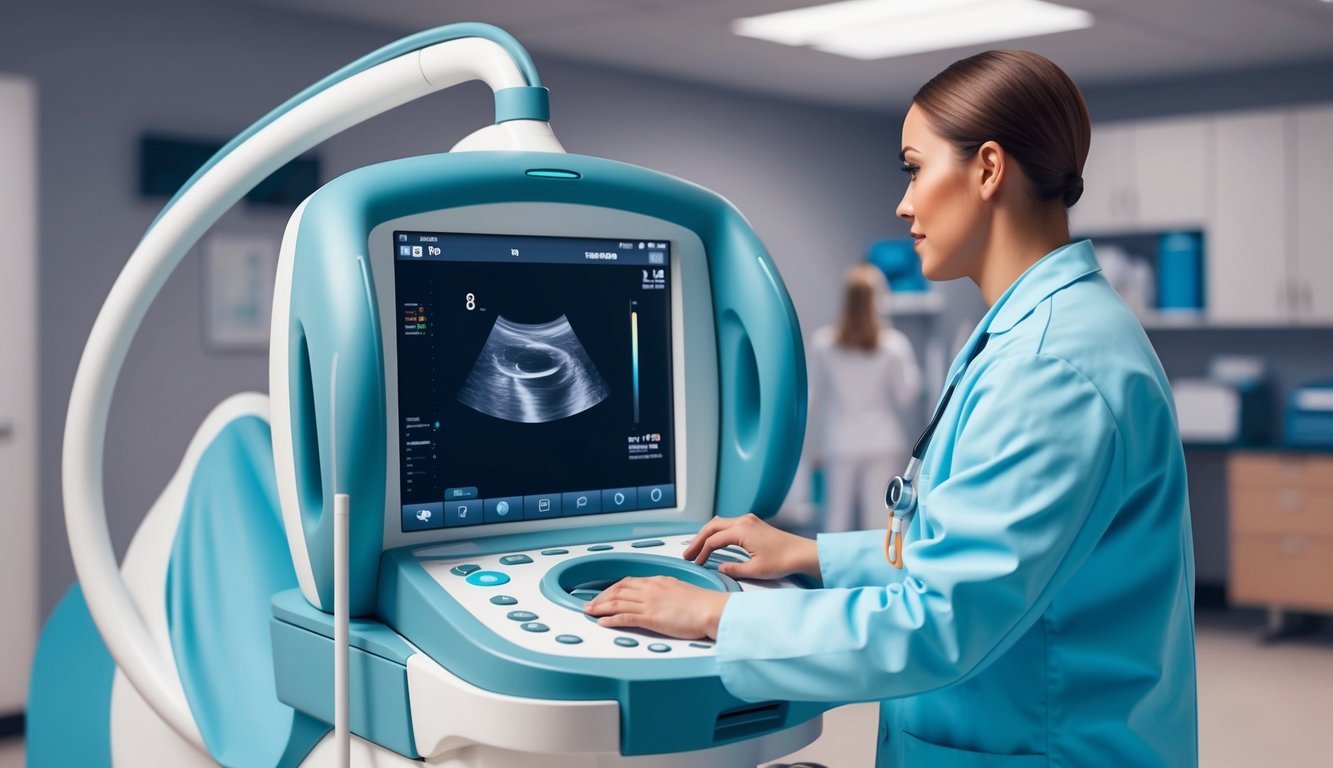As you consider a career in healthcare, understanding the financial prospects is essential. Ultrasound technicians have a median annual salary of approximately $78,210.
Top earners can make upwards of $114,480, depending on location and experience.
This figure not only reflects the demand for skilled professionals but also highlights the potential for growth in this field.
Various factors influence the salary of ultrasound technicians, including state, experience, and specific work settings.
For instance, ultrasound technicians in states like California and Hawaii often enjoy higher salaries due to the cost of living and demand for medical services.
You can find detailed insights into salary variations across states by visiting Nurse.org and ZipRecruiter.
As you explore this career, consider how education, certifications, and specialized skills can impact your earning potential.
Understanding the full landscape of ultrasound technician salaries will equip you to make informed decisions regarding your education and future opportunities in this rewarding field.
Educational Pathways

Understanding the educational requirements is essential for becoming an ultrasound technician.
This section covers the structure of ultrasound technician programs, necessary accreditation and certification, and the benefits of pursuing both associate and bachelor’s degree.
Ultrasound Technician Program Overview
Ultrasound technician programs provide training in the fundamentals of diagnostic medical sonography.
Typically, these programs last from one to four years, depending on the credential sought.
You can choose from a certificate program or pursue an associate or bachelor’s degree.
Most programs include both theoretical coursework and hands-on clinical training.
Common subjects you will study include anatomy, patient care, and physics.
It is crucial to select a program accredited by the Commission on Accreditation of Allied Health Education Programs (CAAHEP) to ensure the quality of education.
Accreditation and Certification Requirements
Accreditation is vital for your education and future employment opportunities.
Programs accredited by CAAHEP meet established standards, which enhances your education’s credibility.
Upon completing an accredited program, you must obtain certification to practice as an ultrasound technician.
The American Registry for Diagnostic Medical Sonography (ARDMS) offers the most recognized certification.
You must pass a series of examinations to earn your credentials.
Additionally, some employers might also prefer candidates certified by the American Registry of Radiologic Technologists (ARRT).
Advancing Education: Associate and Bachelor’s Degrees
You can pursue an Associate Degree in Diagnostic Medical Sonography to enter the field more quickly, typically taking about two years.
This pathway allows you to gain essential skills and knowledge, preparing you for entry-level positions.
A Bachelor’s Degree offers more in-depth education and can enhance job prospects.
This four-year degree covers advanced topics, such as cardiac ultrasound and vascular technology.
Graduates with a bachelor’s degree often have a competitive edge in the job market and may qualify for roles in management or specialized areas of sonography.
Salary Overview

Understanding the salary landscape for ultrasound technicians involves examining key factors that influence pay and exploring how salaries differ across specialties.
The following sections will provide you with a detailed insight into these elements.
Determining Factors for an Ultrasound Technician’s Salary
Several factors influence the salary of ultrasound technicians. Experience plays a crucial role, with entry-level positions earning less than seasoned professionals.
According to the U.S. Bureau of Labor Statistics, the median annual salary is approximately $81,350, while it can range from around $61,430 at the lowest end to over $116,300 for those in the top 10% of earners.
Location significantly affects earnings.
States like Washington and New York report salaries above the national average, sometimes exceeding $98,273.
Additionally, certifications and education, such as earning a graduate degree or certifications in specialties, can enhance your earning potential.
Salary Comparisons by Specialty
Salaries can differ considerably depending on the area of specialization within ultrasound technology.
For instance, those working in Vascular Sonography and Cardiac Sonography often command higher wages due to the complexity and demand for these skills.
Here’s a brief comparison of average salaries by specialty:
| Specialty | Average Salary |
|---|---|
| General Sonography | $81,350 |
| Vascular Sonography | $87,000 |
| Cardiac Sonography | $89,000 |
These figures highlight the importance of considering specialization when assessing potential earnings.
By honing your skills in a niche area, you can enhance your job prospects and increase your income potential.
Role and Responsibilities
As an ultrasound technician, you play a crucial role in healthcare by performing diagnostic imaging and ensuring quality patient care.
Your responsibilities encompass a variety of tasks, from interacting with patients to operating complex ultrasound equipment.
Patient Care and Sonographic Procedures
In your role, patient care is paramount.
You begin by preparing patients for ultrasound exams, explaining the procedure to alleviate any anxiety.
Establishing a comfortable environment is essential.
During the exam, you position the patient correctly and apply gel to facilitate sound wave transmission.
You must capture images from different angles, ensuring high-quality results.
Post-exam, you explain the next steps to patients, helping them understand the process and timeline for results.
Keeping patient records updated is also part of your responsibilities, crucial for ongoing medical care.
Ultrasound Equipment and Imaging Technique
Operating ultrasound equipment requires technical proficiency.
You must understand how to set up and calibrate machines to obtain accurate images.
Familiarity with different types of ultrasound technology, such as Doppler ultrasound, is vital.
During imaging, applying correct techniques is critical to produce diagnostic-quality images.
This includes adjusting settings like frequency and gain based on patient needs and body type.
Regular maintenance and troubleshooting of equipment ensure reliability.
Your attention to detail not only enhances image quality but also contributes to effective diagnostics in the broader scope of medical imaging.
For more insights on this technology, you can visit Nurse.org.
Career Advancement
Advancing your career as an ultrasound technician involves enhancing your skills through experience and education.
You can significantly increase your earning potential by pursuing certifications and additional training.
Experience and Continuing Education
Gaining hands-on experience is crucial for advancing your career.
Working in diverse settings exposes you to various ultrasound techniques and patient types, enhancing your expertise.
Continuing education plays a pivotal role in career growth.
Many employers prefer or require technicians to complete additional training programs.
Organizations like the American Registry for Diagnostic Medical Sonography (ARDMS) offer certification exams that validate your skills.
Certifications in specialized areas, such as Cardiovascular Ultrasound, can set you apart.
Obtaining these credentials demonstrates your commitment to your profession.
This can help you stand out in the job market and open doors to more advanced roles.
Professional Development and Higher Pay Opportunities
Investing in professional development can lead to higher pay opportunities.
Many healthcare facilities offer financial incentives for technicians who pursue advanced certifications or additional training.
Consider exploring specialized certification programs.
For instance, those certified by Cardiovascular Credentialing International often find themselves in higher-paying positions.
Here’s a quick overview of potential certifications and their associated benefits:
| Certification | Potential Benefit |
|---|---|
| ARDMS Certified | Increased job opportunities |
| Cardiovascular Credentialing International | Access to specialized roles and higher pay |
Acquiring new skills not only enriches your capabilities but also increases your negotiation power for salary advancements.
Prioritize training and certifications that align with your career goals to maximize your earning potential.
Workplace Settings

Understanding the workplace settings for ultrasound technicians is crucial for assessing your career options.
These environments can significantly influence your job responsibilities, pay scale, and work-life balance.
Hospitals Versus Outpatient Care Centers
Most ultrasound technicians work in hospitals or outpatient care centers.
Hospitals typically provide a broad spectrum of services, including emergency care, which may require technicians to work varied shifts.
Your responsibilities in hospitals can be diverse, from performing routine scans to assisting in surgical procedures.
In contrast, outpatient care centers offer a more predictable schedule.
These facilities usually focus on routine diagnostic imaging and may provide a calmer workplace environment.
You might encounter fewer emergency cases, allowing for a more structured workday.
| Feature | Hospitals | Outpatient Care Centers |
|---|---|---|
| Work Schedule | Varied shifts, often including nights | Predictable hours, typically weekdays |
| Type of Cases | Diverse, including emergency situations | Mostly scheduled, non-emergency scans |
Impact of Location on Employment Opportunities
Your location can significantly affect your employment opportunities as an ultrasound technician.
Urban areas often boast a higher demand for healthcare professionals.
This provides multiple employment options across various hospitals and outpatient facilities.
In contrast, rural areas may have fewer job openings.
However, these positions could provide higher responsibilities due to limited staffing.
Additionally, salaries can differ based on location.
For example, metropolitan regions might offer higher wages aligned with a higher cost of living.
When considering your career, research the job outlook in your desired area.
The U.S. Bureau of Labor Statistics highlights that opportunities for ultrasound technicians are expected to grow.
This is driven by advancements in technology and an aging population.
Consider looking into targeted resources for regional employment data.
These may provide insights into the best locations for your career aspirations.

